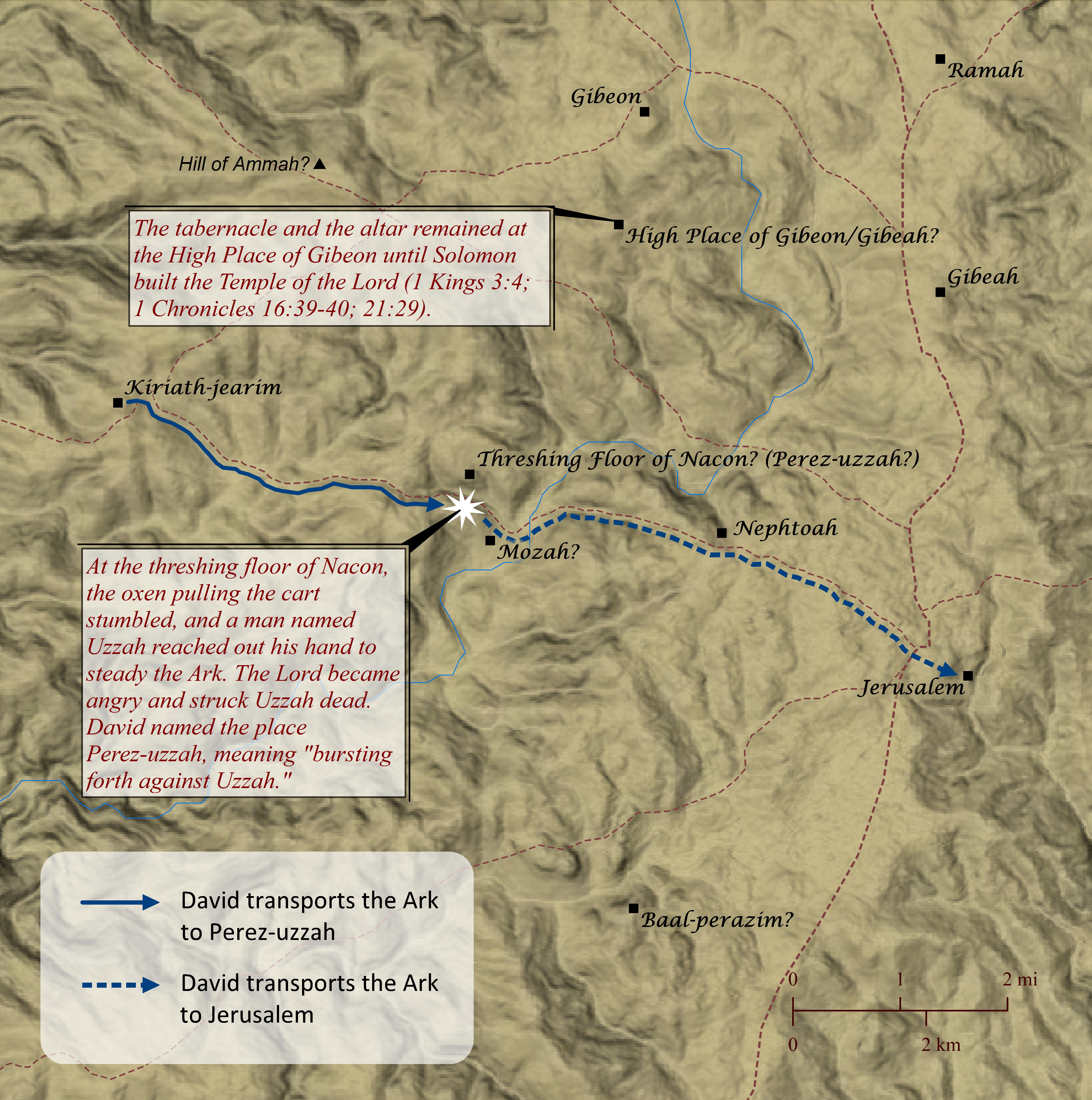Readers’ Version
Literal Version
6 Then David selected thirty thousand Israeli warriors and gathered them together. 2 He led them to Kiriat-Yearim (formerly called Baalah) in Yehudah to get the box of God (whose name is Yahweh the army commander) who lives between the two winged creatures on the top of it.[ref] 3 They placed the sacred chest on a newly-made cart and started moving it from Abinadab’s house which was on a hill. Uzzah and Ahyo (Abinadab’s sons) were leading the cart.[ref] 4 They took it from Abinadab’s house and Ahyo took the lead in front. 5 David and all the Israelis were celebrating in God’s presence with wooden harps and lyres, along with tambourines, shakers, and cymbals.
6 But when they reached Nakon’s threshing floor the oxen stumbled so Uzzah reached out to steady the sacred chest. 7 Yahweh became furious with Uzzah and killed him right there by the sacred chest because he’d touched it. 8 Now David got angry because of Yahweh’s outburst against Uzzah, and that place has been called Perets-Uzzah (meaning ‘The punishment of Uzzah’) until today. 9 David was afraid of Yahweh that day and asked, “How will Yahweh’s box get to Yerushalem?” 10 So he decided not to take Yahweh’s box there and redirected it instead to the house of Obed-Edom (a Gittite). 11 The sacred chest stayed at Obed-Edom’s house for three months, and Yahweh blessed him and all the household.[ref]
12 Someone told King David, “Yahweh has blessed Obed-Edom’s household because of the sacred chest,” so David went and brought God’s Box from Obed-Edom’s house to Yerushalem with much happiness. 13 When the men who were carrying the sacred chest had walked six steps, they stopped and David sacrificed a bull and a fattened calf there. 14 Then David, wearing a linen apron, danced in front of Yahweh, putting everything into it. 15 David and all the Israelis brought the sacred chest into Yerushalem with shouting and trumpet blasts.
16 However, as they were entering the city, David’s wife Mikal (Sha’ul’s daughter) looked out the window and saw King David leaping and dancing in front of Yahweh, and she felt only despite for him. 17 They took Yahweh’s box and placed it in the middle of the tent that David had erected for it. Then David offered burnt sacrifices to Yahweh, as well as peace offerings. 18 When David had finished offering those sacrifices, he blessed the people in commander Yahweh’s name. 19 He handed out a large bread roll, a cake of pressed dates, and a cake of pressed raisins to each man and woman there, then they all returned to their homes.[ref]
20 Then David returned to bless his own house, but his wife Mikal came out to meet him complaining, “What disgraceful behaviour for Yisrael’s king today—dancing when he was wearing so little and exposing himself to his female servants like some brainless person!”
21 “It was to thank Yahweh,” David responded, “who chose me (rather than your father and any of his family) by appointing me as leader over Yahweh’s people Yisrael. I was celebrating in front of Yahweh 22 and I will humiliate and humble myself even more than that. Yet I will end up being honoured by those female servants that you were talking about.”
23 After that, Sha’ul’s daughter Mikal never had any more children.
2 And_he/it_rose_up and_he/it_went Dāvid and_all the_people which with_him/it from_Baale- Yehuda to_bring_up from_there DOM the_box_of the_ʼElohīm which it_is_called the_name the_name_of YHWH hosts who_sits the_cherubims on/upon/above_him/it.
3 And_set DOM the_box_of the_ʼElohīm to a_cart a_new and_brought_it from_house_of ʼAⱱīnādāⱱ which in/on/at/with_hill and_ˊUzzāʼ and_ʼAḩyō the_sons_of ʼAⱱīnādāⱱ were_leading DOM the_cart new.
4 And_brought_it from_house_of ʼAⱱīnādāⱱ which in/on/at/with_hill with the_box_of the_ʼElohīm and_ʼAḩyō was_walking to_(the)_face_of/in_front_of/before the_box.
5 And_Dāvid and_all the_house_of Yisrāʼēl/(Israel) were_playing to_(the)_face_of/in_front_of/before YHWH in/on/at/with_all_of wood(s)_of fir_trees and_in/on/at/with_lyres and_in/on/at/with_harps and_in/on/at/with_tambourines and_in/on/at/with_sistrums and_in/on/at/with_cymbals.
6 And_they_came to the_threshing_floor_of Nākōn and_ ˊUzzāʼ _reached_out to the_box_of the_ʼElohīm and_took_hold in/on/over_him/it if/because they_had_stumbled the_oxen.
7 And_it_glowed/burned the_anger of_YHWH in/on/at/with_ˊUzzāʼ and_struck_down_him there the_ʼElohīm on the_irreverence and_he/it_died there beside the_box_of the_ʼElohīm.
8 And_it_glowed/burned to_Dāvid on that he_had_broken_out YHWH a_breaking_out in/on/at/with_ˊUzzāʼ and_he/it_called to_the_place (the)_that Perez ˊUzzāʼ until the_day the_this.
9 And_ Dāvid _afraid DOM YHWH in_the_day (the)_that and_he/it_said how will_it_come to_me the_box_of YHWH.
10 And_not Dāvid he_was_willing to_take to_him/it DOM the_box_of YHWH to the_city_of Dāvid and_took_aside_it Dāvid the_house_of Obed- ʼEdōm the_Gittiy.
11 And_ the_box_of _he/it_sat_down//remained//lived of_YHWH the_house_of Obed- ʼEdōm the_Gittiy three months and_ YHWH _he/it_blessed DOM Obed- ʼEdōm and_DOM all_of household_of_his.
12 And_told to/for_the_king Dāvid to_say YHWH he_has_blessed DOM the_household_of Obed- ʼEdōm and_DOM all_of that to_him/it in_account_of the_box_of the_ʼElohīm and_ Dāvid _he/it_went and_he/it_ascended DOM the_box_of the_ʼElohīm from_house_of Obed- ʼEdōm the_city_of Dāvid in/on/at/with_rejoicing.
13 And_he/it_was if/because they_had_stepped (of)_the_box_of those_who_carried_of YHWH six steps and_he/it_sacrificed an_ox and_fatling.
14 And_Dāvid was_dancing in_all strength to_(the)_face_of/in_front_of/before YHWH and_Dāvid was_girded an_ephod_of linen.
15 And_Dāvid and_all the_house_of Yisrāʼēl/(Israel) were_bringing_up DOM the_box_of YHWH in/on/at/with_shouting and_in/on/at/with_sound_of a_ram’s_horn.
16 And_it_was the_box_of YHWH coming the_city_of Dāvid and_Mīkāl the_daughter_of Shāʼūl/(Saul) she_looked_down through the_window and_she/it_saw DOM the_king Dāvid leaping and_dancing to_(the)_face_of/in_front_of/before YHWH and_despised to_him/it in/on/at/with_heart_of_her.
17 And_brought DOM the_box_of YHWH and_set DOM_him/it in/on/at/with_place_of_its in_the_middle the_tent which he_had_pitched to_him/it Dāvid and_ Dāvid _he/it_ascended burnt_offerings to_(the)_face_of/in_front_of/before YHWH and_fellowship_offerings.
18 And_ Dāvid _they_were_ended/finished from_offering the_burnt_offerings and_the_fellowship_offerings and_he/it_blessed DOM the_people in/on_name_of YHWH hosts.
19 And_distributed to/from_all/each/any/every the_people to/from_all/each/any/every the_multitude_of Yisrāʼēl/(Israel) from_both_men and_unto a_woman to_each a_cake_of bread one and_cake_of_dates one and_cake_of_raisins one and_ all_of _he/it_went the_people each to_house_of_his.
20 And_ Dāvid _returned to_bless DOM household_of_his and_ Mīkāl _came_out the_daughter_of Shāʼūl to_ Dāvid _meet and_she/it_said how he_has_honoured_himself the_day the_king_of Yisrāʼēl/(Israel) who he_has_uncovered_himself the_day in_eyes_of the_maidservants_of servants’_of_his as_uncover shamelessly_(uncover) one the_vulgar.
21 And_ Dāvid _he/it_said to Mīkāl to_(the)_face_of/in_front_of/before YHWH who he_chose in/on/at/with_me over_father_of_your and_above_all_of house_of_his to_appoint DOM_me ruler over the_people_of YHWH over Yisrāʼēl/(Israel) and_celebrate to_(the)_face_of/in_front_of/before YHWH.
22 And_make_contemptible still than_this and_I_will_be lowly in/on/at/with_eyes_of_my_own and_by the_maids whom you_have_said with_them I_will_be_honoured.
23 And_for_Mīkāl the_daughter_of Shāʼūl/(Saul) not it_belonged to/for_her/it a_child until the_day_of death_of_her.

